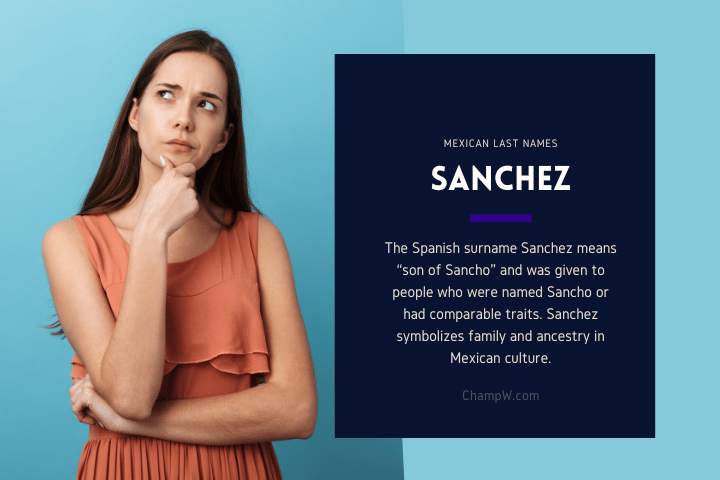Mexican last names are windows into a vibrant cultural tapestry woven together by history, tradition, and identity. By exploring the stories and meanings behind our surnames, we can better understand and appreciate the depth of our Mexican heritage.
From the origins of common last names to the cultural traditions behind them, we’ve got you covered. One of the fascinating aspects of Mexican last names is how they often reflect a combination of Spanish, indigenous, and even other European influences.
Take a quick look at Mexican girl names. In Mexican culture, one’s last name carries a sense of pride and connection to one’s ancestors. Many families have stories passed down through generations about how their last name originated or the notable individuals who carried the name before them.
Mexican Last Names
Complete list of last names popular choices for you:
- Ramos – Means “branches” in Spanish, signifying someone who lived near a conspicuous tree or in a thickly wooded area.
- Vásquez – Patronymic name meaning “son of Vasco”, with Vasco being a given name of uncertain meaning, possibly related to the Basque people.
- Medina – Arabic origin, meaning “city” or “town”, indicating someone from a place named Medina or a person from a city.
- Fernández – Patronymic, meaning “son of Fernando”, with Fernando deriving from Germanic elements meaning “brave journey”.
- Jiménez – Patronymic, meaning “son of Jimeno”, an old Spanish personal name of uncertain origin.
- Velásquez – Patronymic, meaning “son of Velasco”, with Velasco being a personal name of uncertain meaning, possibly related to “crow”.
- Contreras – Toponymic, referring to someone from a place named Contreras, derived from Latin “contra” (against), possibly indicating a location opposite another.
- Aguilar – Toponymic, denoting someone from a place with many eagles (from Latin “aquilare”).

- Díaz – Patronymic, meaning “son of Diego”, with Diego being a Spanish form of James.
- Ramírez – Patronymic, meaning “son of Ramiro”, with Ramiro derived from Germanic elements meaning “counsel” and “famous”.
- Romero – Originally denoting a pilgrim or one who has visited the Holy Land, from Latin “romaeus”, meaning “to Rome”.
- Herrera – Occupational name for an iron worker or a smith, from Latin “ferraria”.
- Guerrero – Occupational or descriptive, meaning “warrior”, from Spanish “guerra” (war).
- Sánchez – Patronymic, meaning “son of Sancho”, with Sancho derived from Latin sanctus meaning “holy” or “saint”.
- Flores – Originally a nickname for someone with a floral aspect or possibly a location name with abundant flowers.
- Hernández – Patronymic, meaning “son of Hernando” or “son of Fernando”, again deriving from elements meaning “brave journey”.

- Vargas – Toponymic or descriptive, possibly from a place name or denoting someone from a slope or a fenced pasture.
- Chávez – Variant of Chaves, a toponymic name referring to someone from Chaves, a town in Portugal.
- Mendoza – Toponymic, from a place in Spain, meaning “cold mountain” in Basque.
- Ortega – Toponymic or descriptive, possibly from “ortiga” (nettle), indicating someone who lived near nettles or resembled one in some way.
- Juárez – Patronymic, meaning “son of Juaro”, a medieval personal name.
- Martínez – Patronymic, meaning “son of Martín”, with Martín being derived from Martinus, a Roman name referring to Mars, the god of war.
- Domínguez – Patronymic, meaning “son of Domingo”, with Domingo meaning “Sunday” in Spanish.
- González – Patronymic, meaning “son of Gonzalo”, with Gonzalo being a personal name of Germanic origin.

- Castro – Toponymic, meaning “fortress” or “castle”, indicating someone who lived near a castle.
- Gómez – Patronymic, meaning “son of Gome”, with Gome being a medieval personal name of uncertain meaning.
- Garza – Descriptive, meaning “heron”, likely a nickname for someone resembling a heron in some way.
- Soto – Toponymic, meaning “grove” or “small forest”, indicating someone who lived near a soto.
- Guzmán – Of uncertain origin, possibly a toponymic name or a name derived from the Germanic word “gotsmann”, meaning “good man”.
- Castillo – Toponymic, meaning “castle”, indicating someone who lived near or worked in a castle.
- Muñoz – Patronymic, meaning “son of Muño”, with Muño being a medieval personal name.
- Cruz – Descriptive or toponymic, meaning “cross”, possibly indicating someone who lived near a cross or a religious person.

- Álvarez – Patronymic, meaning “son of Álvaro”, with Álvaro being a personal name of Germanic origin meaning “all guard”.
- Cortez – Descriptive, possibly derived from “corte”, meaning “court”, indicating someone who worked at a court or had a courteous demeanor.
- Ruíz – Patronymic, meaning “son of Ruy”, a short form of Rodrigo, from Germanic elements meaning “famous power”.
- Gutiérrez – Patronymic, meaning “son of Gutierre”, with Gutierre being a Spanish form of the Germanic name Walter, meaning “ruler of the army”.
- García – Of uncertain origin, possibly a pre-Roman or Basque origin, or a patronymic from a medieval personal name.
- Estrada – Toponymic, meaning “road” or “pathway”, indicating someone who lived near a significant road.
- Rodríguez – Patronymic, meaning “son of Rodrigo”, again deriving from elements meaning “famous power”.
- Pérez – Patronymic, meaning “son of Pedro”, with Pedro being the Spanish form of Peter, meaning “rock”.
- Ortíz – Patronymic, meaning “son of Orti”, a medieval personal name of uncertain origin.
- Rojas – Descriptive, meaning “red”, possibly a nickname for someone with red hair or complexion.
- Méndez – Patronymic, meaning “son of Mendo”, a medieval personal name of uncertain origin.
- Salazar – Toponymic, from a place in Spain, possibly meaning “old hall” in Basque.
- Reyes – Descriptive or toponymic, meaning “kings”, possibly indicating someone who worked in the king’s household or lived in a place named Reyes.
- López – Patronymic, meaning “son of Lope”, with Lope derived from Latin “lupus”, meaning “wolf”.
- Rivera – Toponymic, meaning “riverbank”, indicating someone who lived near a river.
- Torres – Toponymic, meaning “towers”, indicating someone who lived near or worked in towers.
- Morales – Toponymic or descriptive, meaning “mulberry trees”, indicating someone who lived near such trees.
- Luna – Descriptive, meaning “moon”, possibly a nickname based on personality or appearance.
- Moreno – Descriptive, meaning “dark” or “swarthy”, likely a nickname based on complexion or hair color.
Final Words
Mexican last names have a rich history and cultural significance that reflect the diverse influences of Mexico‘s past. From indigenous roots to Spanish colonization, these surnames carry with them stories of resilience, identity, and heritage. Understanding the meanings and origins of Mexican last names can provide valuable insights into the country’s complex social fabric and historical development.
